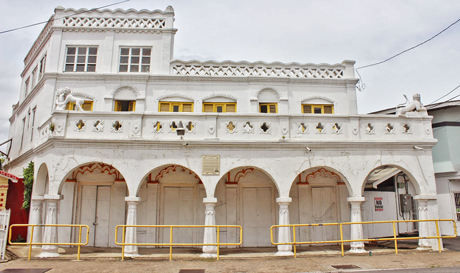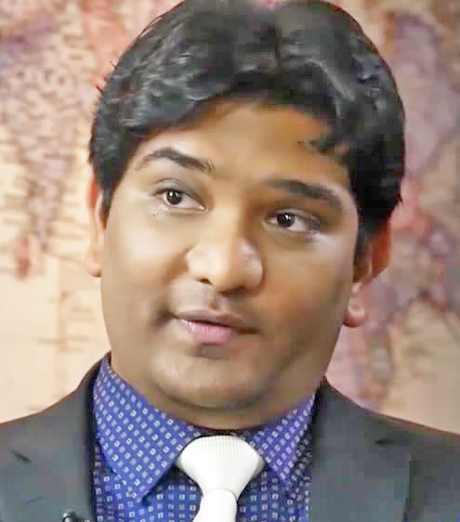Trinidad & Tobago
'Lion House' - standing symbol and memory of the Indian diaspora -
in shambles

By Paras Ramoutar
Port-of-Spain – As Trinidad and Tobago celebrates the 174th anniversary of the arrival of East Indians, May 30, 2019, there must be more meaningful recognition and respect to the Indian diaspora, whether it is by the Government or corporate or civic-minded organizations.
This recognition is long overdue. And the entity charged with such assignment, the National Trust of Trinidad and Tobago, remains in deep sleep while a major piece of our national heritage and history remains a haven for vagrants in Main Road, Chaguanas.
I am referring to the Lion House which was fully highlighted in V.S. Naipaul’s Nobel-prize winning book, “A House for Mr. Biswas”. That edifice which has a colourful history of the Indian diaspora, produced notable leaders like Dr. Rudranath Capildeo, eminent international scientist who was a formidable figure in our Independence Conference in Marlborough House, London in 1962, and the first Leader of the Opposition in our Parliament. It was the birthplace of the late Nobel Laureate, Sir Vidya Naipaul, who had fond memories of this classical structure. Another famous member of the Capildeo clan, was the late Simboonath Capildeo, Rudranath’ elder brother.
The Lion House has a symbiotic relationship with the Indian diaspora here, and probably the Caribbean or other parts of the globe where East Indians are assembled. Over the years, scores of tourists and students and academia visited the edifice. Now it is in total shambles, and quick attention must be paid to restore it to its original moorings.
It seems to the public that the National Trust is suffering from bouts of inertia, having publicly acknowledged the Lion House as a major piece of our national heritage, yet nothing has been done over many years to publicly restore the building for all to know and consider. It remains an integral factor for the new history of Trinidad and Tobago. Our students, particularly primary and secondary, would be deprived of visiting and knowing the whole gamut of our history.
On March 24, members of the Capildeo clan, along with former Minister of Works and Transport, Dr Surujattan Rambachan and Chaguanas Mayor Gopaul Boodan visited the house and lamented at its deterioration and called for restoration work to be undertaken urgently to salve what is left of this great piece of history and architecture. Dr Rambachan announced that he has held discussions with a Chaguanas businessman who was willing to effect repairs.
However, Mrs Savitri Naipaul-Akal, sister of Sir Vidya Naipaul, called on the Capildeo family to settle their differences in a bid to save the Lion House from collapse, extinction. The question of ownership of the property is not fully known. Naipaul-Akal who was born there, said. “The last time I was here it was really so vandalized. I was shocked because sums of money had been spent in the past to little or no avail, and the problem of the house is ownership and that has to be settled”.
It is ironic that the Capildeo family has had a well-established legal practice, yet the question of its ownership, to date, has not been sorted out to quote Mrs. Naipaul-Akal. And this issue must be revisited, and should be undertaken very swiftly as the younger Capildeos seemed estranged from the entire project. And then, the edifice would become a home for vagrants fully.
The Lion House was specifically carved by the late Pundit Capildeo, one of our early East Indian settlers among the 147,000 Indian immigrants who came to Trinidad to assist in rekindling the agricultural economy between 1845 and 1917, in this country, and remains a pivotal figure in the Indian diaspora in its 174 year history. Why not treat the Lion House with the same aggressiveness and enthusiasm like the Stollmeyer’s Castle. As a matter of fact, the National Trust and its attendant agencies have not fully met its legislative mandate. There are several other projects needed to be recognized in Central Trinidad. Our Minister of Culture, Community Development and the Arts should pull up the socks or stockings of its leadership, and spur them to get serious. The National Alliance for Reconstruction (NAR) Government did intervene to refurbished it, but this got nowhere.
Major restoration works on the Lion House needs to be undertaken with the urgency it deserves. It remains the standing symbol and memory of the Indian diaspora. Pundit Capildeo was born in 1873 in his family’s village of Mahadevadubey, Simra County of Gorakphur, East Central, Uttar Pradesh, India. Pundit Capildeo had moved from indentureship to become a successful businessman, land owner, cane farmer and religious leader within the Hindu community. The structure mirrors the Gupta style of the 5th century. It served as a religious sanctuary in the propagation of Hinduism, Hindu Thought and Philosophy. And this is an ample reason for the Government of India to take it over and attach it as an annex of the long-awaited Mahatma Gandhi Centre for Cultural Co-operation. This idea is seriously worth considering and should be fully implemented as it is the only such piece of Indian architecture on this side of the Atlantic.
Construction of the Lion House began in 1924 and was completed in 1926, and named "Anand Bhavan" or the Mansion of Bliss. Around the same time, Pundit Capildeo left for India and died there.
Fr. Anthony de Verteuil, in his publication, “East India Immigrants”, identifies the Lion House this way: “Outstanding in its own right, the house has become internationally famous because of its description in cynical style by his grandson, Sir Vidiadhar Surujprasad Naipaul, in his book, A House for Mr.Biswas, in which he transforms the lions into representations of the monkey-god Hanuman, Capildeo becoming Tulsi and Chaguanas Arwacas.”
Over the years, this structure has been many things to many people. In its early history it was a meeting place for travellers from all over Trinidad and those passing through Chaguanas and it became a communal meeting point.
Except for the intervention of Pundit Capildeo’s grandson, Suren Capildeo, around 1995, nothing formidable was done…not even by the National Trust. Suren Capildeo had retained architect Colin Laird to advise and supervise the project which was awarded to EWAC & Co. However, work was halted, but was later completed in 2001 with the total cost borne by Capildeo.
So where, and why do we have the National Trust which remains a paper entity? And equally, not undertaking urgent work to restore and maintain our nation’s physical history?
I call upon the National Trust to act swiftly and intervene and save the Lion House before it dissipates into oblivion and becomes a full-fledged haven for vagrants.
About 1:30 pm on Friday, eyewitnesses said the businessman was mingling with fellow Muslims at the Junon Street West Masjid in California when he was approached by a gunman. Mohammed then ran up a flight of stairs and into a prayer room where he was shot and killed.
Al-Rawi denounced attempts to compare the murder of Mohammed to the mass killings in March at a masjid in Christchurch, New Zealand.
“There is no way we are going to compare this murder to the incident in New Zealand, that act of terrorism is not what happened in central on Friday. What happened was that someone was chased into a masjid and killed. That certainly does not sound like a hate crime or an act of terrorism, that sounds like a murder,” Al-Rawi said.
Al-Rawi expressed condolences to the family, saying that the killing of the businessman was being investigated by police. He added every murder in the country was unacceptable.
“It is even more tragic in the manner this killing occurred and in the month of Ramadan. But I will not read into that, that it is an act of terrorism targeted against Muslims. I want to totally denounce any attempt to do that,” he insisted.
Al-Rawi’s comment came in the wake of a statement made by Concerned Muslims of Trinidad and Tobago PRO Imtiaz Mohammed, who said the murder on Friday made him reflect on the mass killings in New Zealand.
“After the New Zealand massacre, the media asked me, if I felt the same thing can happen here, I said, ‘Don't rule it out'. And today we have the brutal and violent murder of Haniff in the Junon Street Masjid,” he said.
Imtiaz said the country has been under siege for the past decade and it seemed to be getting worse day after day. He said the criminals are ahead of the game when compared to the law enforcement agencies, and the police are trying to play catch up to no avail.
Following Imtiaz’s statement, the Anjuman Sunnat-ul-Jamaat Association said Mohammed’s murder appeared to be an isolated incident, and was not representative of a larger threat to the Muslim community.
“This unfortunate incident is being viewed as an isolated one and not an attack in any way on the Muslim community,” ASJA’s PRO Imam Raffaic Mohammed said.
He quoted from the Qur'an in extending condolences to Mohammed’s family, and urged them to remain steadfast in their faith.
The Imam said mosque members were traumatised following the killing, which took place after Friday Jumu’ah. He said Salah, a physical, mental, and spiritual act of worship, observed five times each day, was conducted hours after at the mosque. Taraweeh was also conducted later that day, which are extra prayers performed by Sunni Muslims at night following Isha prayer. Muslims are currently observing the holy month of Ramadan.
The Imam added the time had come for leaders to “come together and put some kind of security measures in place”. He added, “I do not think we can really rely on the [Trinidad and Tobago Police Service] to protect the people and mosques twenty-four seven.”
Secretary of the Masjid-ul-Muttaqeen in Cunupia, Shiraz Ali, also said the murder was as an unfortunate incident.
“When we look at the international powers of the world, there is absolutely no respect for places of worship,” Ali said. He recalled recent incidents in India, Sri Lanka, China, and New Zealand, countries where respect for human life are being diminished daily.
Said Ali: “Human beings are most vulnerable when they go to their respective place of worship. They are basically arms-down… nobody is thinking about fighting, so you will catch a person in a condition where he is not expecting a fight because he is in communion with his Lord… but history shows it is how it is.”
At Mohammed’s funeral service on Sunday, Iman Clyde Ali appealed to criminals to stop desecrating places of worship, and turning the country into a gangster’s paradise.
Said the Imam: “We are appalled that the walls of the mosque were desecrated. We know that around the world cathedrals and churches are also desecrated because of crime. There needs to be respect for places of worship. People need to respect life.”
Additionally, “Our beloved land, which we worked hard so build a nation… is becoming a gangster paradise… The soul of the country was being strangled by crime… Our beloved land which we worked so hard to build as a nation [is] today a gangster's paradise.”

Commenting on increased natural gas production and the marginal growth in 2018 identified at 0.7 percent by the World Bank, Arjoon said this was not enough.
“While this is positive news, we have a long way to go before we can safely say that the economy has ‘turned around’,” he said. He added positive statistics are just one part of the story.
“Many are still struggling to put food on the table, fill gas in their car, pay rent and utilities, or afford to renovate their homes. At the macro-economic level, many are struggling to find jobs as the labour market continues to tighten. SMEs are fraught with low sales, profitability woes, and high costs of doing business, foreign exchange earnings and availability are still highly problematic, foreign investment still continues to wane especially in the non-energy sectors, while many persons are engaging in capital flight – sending their monies abroad – as they have little confidence in the local economy,” he said.
Additionally, “The fact is that any growth we are experiencing is not translating into better value for money and an improved business environment, even after spending (TT) $274.1 billion and taking on $29.1 billion in further debt in the last five years.”
Arjoon said the growth and its lack of value suggested Trinidad and Tobago’s economic management should engage in better quality expenditure, a reduction of over-reliance on debt, and limiting inequalities in the distribution of wealth. He also noted only certain segments of the economy have been benefitting from revenues and foreign exchange earnings from the higher gas output.
“Corruption also continues to crowd-out the progress of the non-energy sectors, as monies lost to corruption could have alternatively been used to provide much needed funding to other areas, for instance, upgrading our Port of Port-of-Spain, or financing various small business activities,” he said.
He also noted confidence has not fully returned to the economy as some businesses still engage in capital flight.
“Our forex balance has dropped by 26 percent in the last five years, currently standing at US $7.8 billion, although this is a healthy balance relative to our Caribbean counterparts, we can only call US $4 billion truly ours as our external debt is US $3.8 billion. Foreign investors are also leaving Trinidad and Tobago. From a buoyant Foreign Direct Investment of over US $661 million in 2014 we now have negative FDI,” he said.
Arjoon said the fiscal and monetary environment, together with the forex inaccessibility, continues to undermine revenue generation and the investments in the commercial and industrial sectors.
Said Arjoon: “Indeed, to engage in procyclical fiscal policy during a downturn and increase taxes thereby increasing the cost of doing business, especially in a small developing economy as ours, was not a wise idea, and we are seeing the effects now. This is clearly shown by our macroeconomic fundamentals, such as an inflation rate of 1.1 percent and a slowdown in trade, with a projected current account balance at 0.6 percent in 2019, down from 4.9 percent of GDP in 2018, despite the increase in gas production.”
“It is something that we will continue to work on,” Young said.
He was responding to questions regarding non-payment of salaries to several private security firms employed by the Ministry of Education. Also affected were officers at the Immigration Detention Centre, and contract employees with Trinidad and Tobago Television.
“Persons have their expenses, some of us have expenses that will come out of your account regardless of whether money comes in. So I would like to apologise for the instances where this has happened,” Young said.
Additionally, “Unfortunately it is only brought my attention and every other minister's attention after the fact, they never come to you and say, ‘By the way, Minister, if something doesn't happen in the next two days there is going to be a problem with payment’. It is always after the fact, and of course, as Minister you take responsibility for it.”
Young said the Minister of Finance starts off on a daily basis being told what the current level of the overdraft is, and it was always a balancing act.
He said the Minister of Public Utilities had also brought to Cabinet’s attention there were outstanding sums owed to MTS by government ministries and entities. “It was something that we were supposed to focus on, and I am a little disappointed to hear that that still exists,” he said.
Young said he has taken notes to Cabinet for approval to pay MTS. He said with respect to security companies that are owed monies by the Ministry of Education, Cabinet took a decision last week to allow the Minister of Finance to make a significant sum of around (TT) $100M for the payment of those types of contracts in the Ministry of Education.
